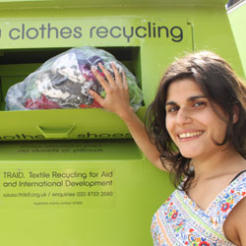A proposal to offer a single textile recycling bank contract across multiple London boroughs has caused concern among charities which fear they could lose a fundraising lifeline in the capital.
London Councils, alongside the London Waste and Recycling Board, is investigating the possibility of creating a pan-London contract to deliver textile recycling services. Contracting out the sites like this would be a revenue generator for councils, who currently allow charities to use sites for textile recycling bins for free on a borough by borough basis.
Councils in the capital face reductions in government spending of £657m (9.1 per cent) in 2011/12 and £461m next financial year. In first discussing the proposal to have one provider supply textile banks across the city, at a roundtable last March, London Councils cited the schemes revenue-generating potential and held up as an example Hertfordshire Council, which last year had charities remove their textile banks after awarding a council-wide contract to a private firm. The issue was again discussed at last month's Transport and Environment Committee meeting.
Traid, which stands to lose up to 200 textile recycling banks if a pan-London contract is awarded to an alternate provider – likely the highest bidder - is concerned that if implemented “the scale of it would be devastating”.
A spokeswoman for Traid told civilsociety.co.uk that “because Traid raises its money solely from textile recycling… the impact on us is tremendous.”
London is a critical market for the charity and the only city in which it has charity shops. “Our textile banks are our public face,” said the spokeswoman. “It could hit us incredibly hard.”
The Charity Retail Association has also expressed opposition to the proposals and says it is engaging with London Councils and putting pressure on boroughs to maintain the existing arrangements.
“We do have serious concerns about the impact this will have on charity shops in London, which use textile banks as a vital means to generate stock. Significant income will be lost for charities in the capital if they lose their bank sites, as well as job and volunteering opportunities,” said CRA chief executive Warren Alexander.
“We understand that councils are trying to maximise income, but we have seen this kind of large tendering in other areas and charities have simply been squeezed out of the market by large commercial rag merchants selling clothing abroad for profit.”
The Traid spokeswoman added that while the details of the proposals remain unclear – it is not even known which councils make up the 17 being consulted and whether a lead council has been appointed – it is critical that lobbying is done now before changes are implemented which would be difficult to reverse.
London Councils said it was aware that charities are concerned about the possible impact of a pan-London provider. A spokesman for the group said: “We have discussed the proposal with the body representing charity shops. These are just proposals and discussions are at a very early stage, no decisions have been made."









